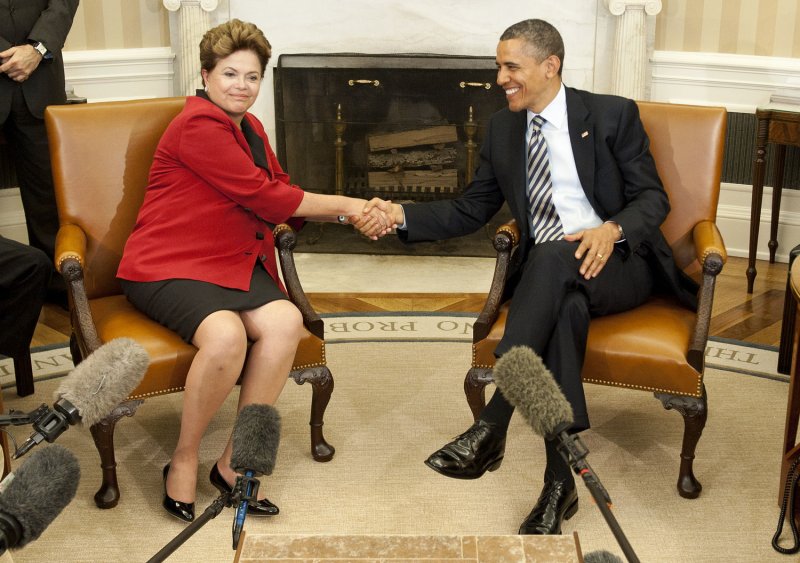U.S. President Barack Obama meets with Brazilian President Dilma Rousseff in the Oval Office of the White House in Washington on April 9, 2012. UPI/Kevin Dietsch |
License Photo
BRASILIA, Brazil, April 13 (UPI) -- U.S. Secretary of State Hillary Clinton is due in Brazil next week for another jab at reaching convergence on key foreign policy and global finance issues, including Cuba, the Middle East, monetary expansion and trade.
The follow-up to this week's Washington summit of Brazilian President Dilma Rousseff and U.S. President Barack Obama follows news reports the talks didn't achieve a level of success preferred by either side.
The Obama-Rousseff meeting built on the U.S. president's initiatives on international diplomacy and trade, taken when he visited Brazil in March 2011.
More than a year after that visit, contacts have grown between the two sides but differences remain over Brazil's positions on Cuba, Iran, Syria, monetary policies and trade.
As a result, little progress was made toward Brazilian expectation of winning U.S. support for a permanent U.N. Security Council seat, Brazilian media reported.
Brazilian-U.S. defense cooperation has grown since Rousseff took over from Luiz Inacio Lula da Silva last year but analysts ask if recent growth in contact will lead to U.S. defense suppliers having a greater share of the Brazilian armed forces' multibillion-dollar shopping spree.
The Boeing Co. is a contender for a multibillion-dollar contract for the supply of 36 or more fighter jets to replace the Brazilian air force's aging inventory.
Boeing is fielding its F-16 Super Hornet jet fighter against French Dassault Aviation's Rafale jet and Swedish firm Saab's Gripen jet fighter in the Brazilian air force's FX-2 jet fighter competition, a major part of Brazil's military modernization program.
Brazil reacted angrily when the U.S. Air Force abruptly canceled a program that could have landed aircraft maker Embraer a contract for the supply of Super Tucano light aircraft for U.S. operations in Afghanistan.
Embraer's Super Tucano entry caused adverse reaction among U.S. defense suppliers and Air Force procurement officials faced the prospect of being hauled into court. Litigation is pending over the Embraer deal that failed to materialize.
Clinton's bridge building diplomacy includes meetings at the Bilateral Dialogue forum, where the secretary of State will renew contacts with Brazilian External Affairs Minister Antonio Patriota.
Clinton is also to attend the Open Government Partnership conference Tuesday and Wednesday in Brasilia. OGP was launched last year to look into potential collaboration at different levels.
Business collaboration has been clouded by Brazilian accusations that neither the European Union nor the United States are doing enough to deal with a "monetary tsunami" which has led to large liquidity transfers to countries with attractive interest rates.
Brazil says the inward investment has unduly overvalued its currency and made Brazilian exports harder to promote.





